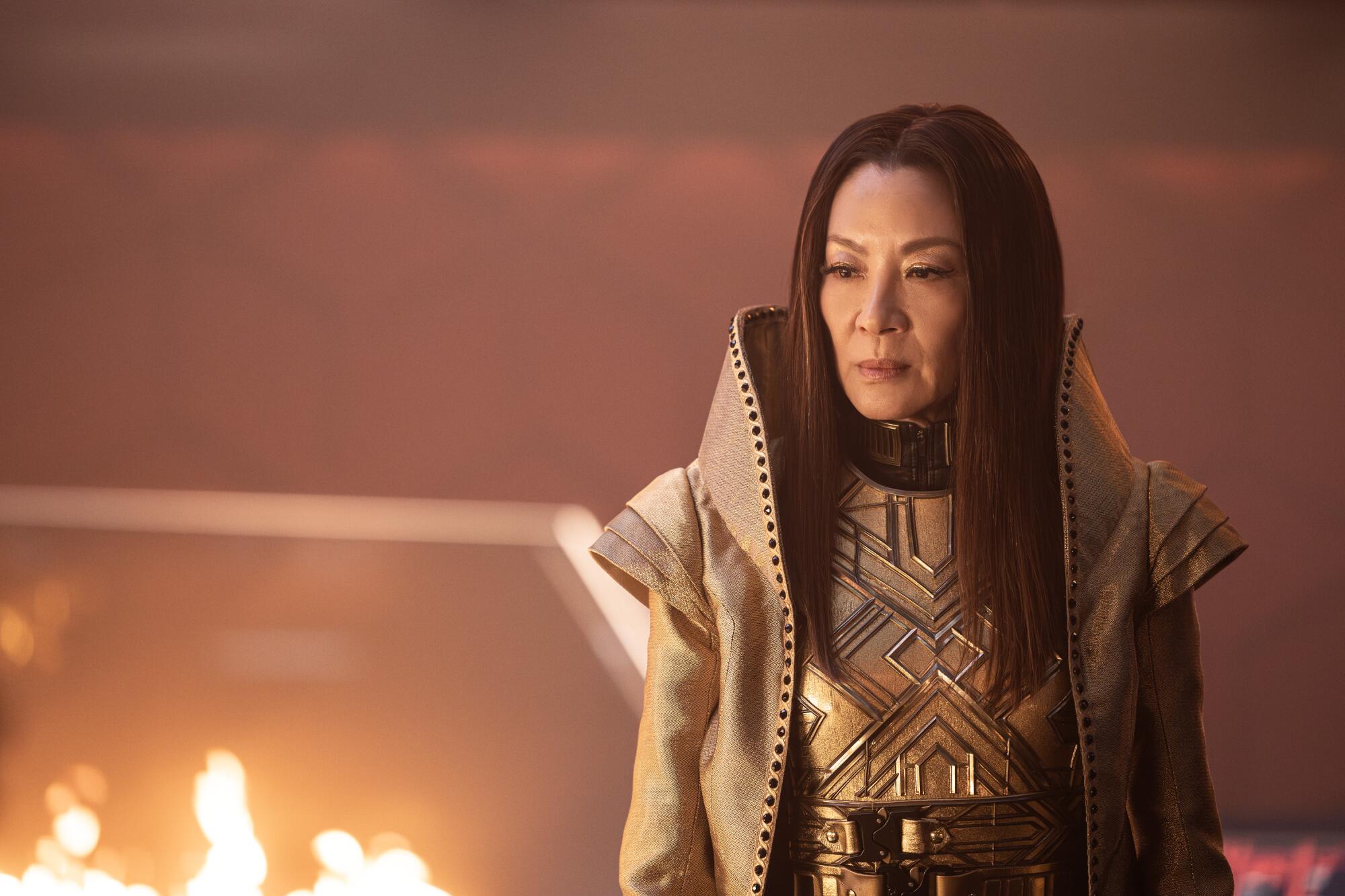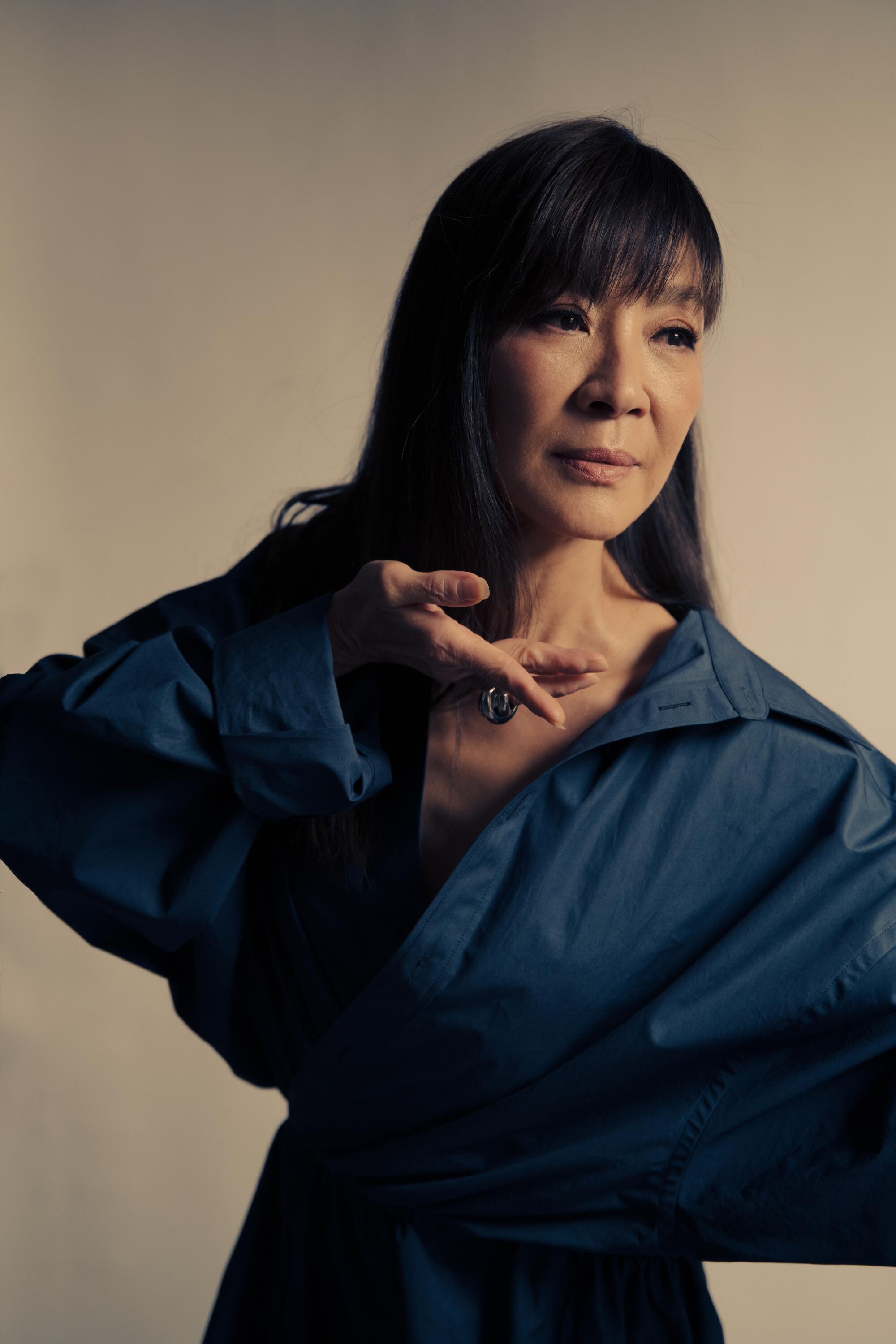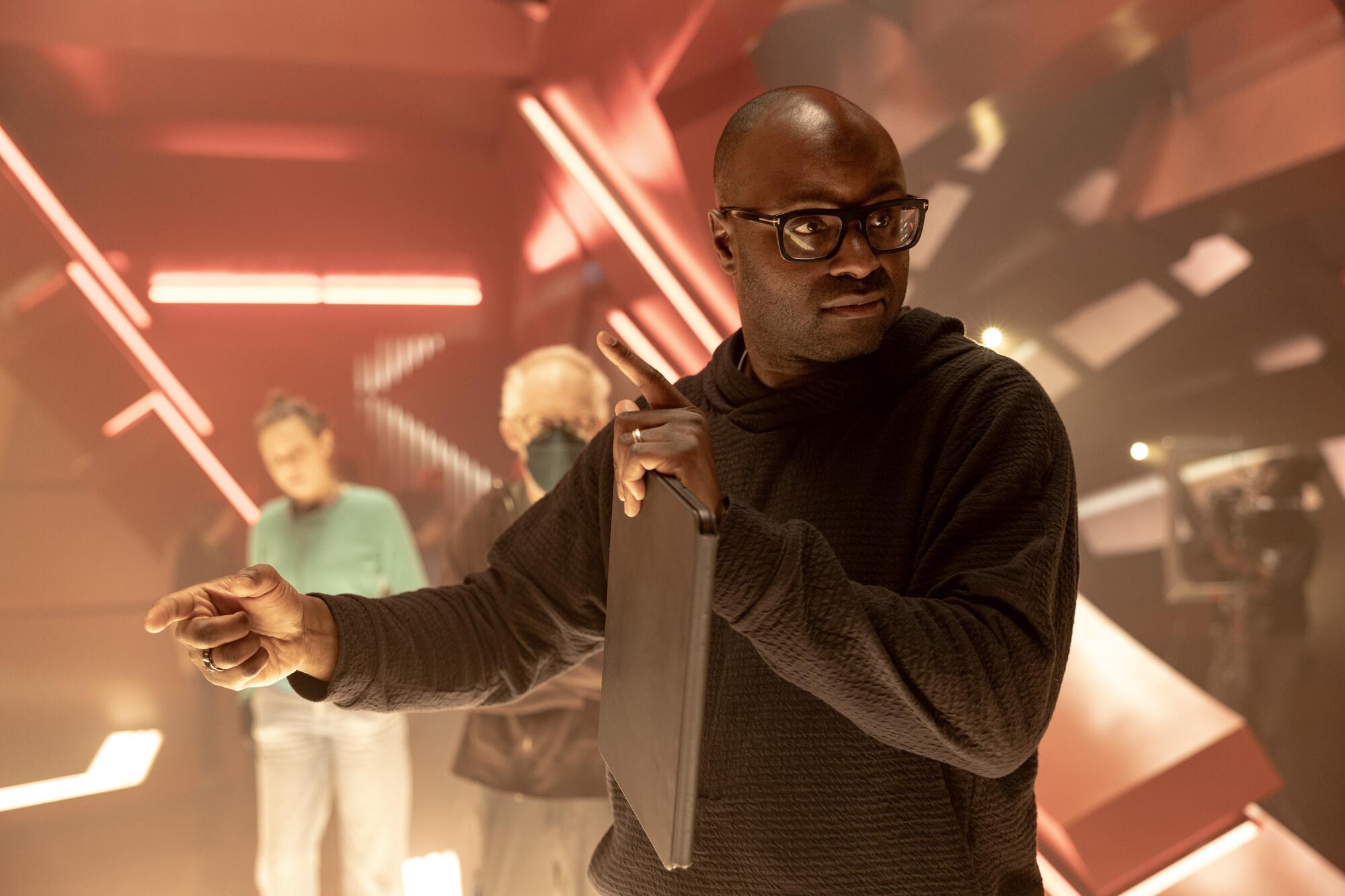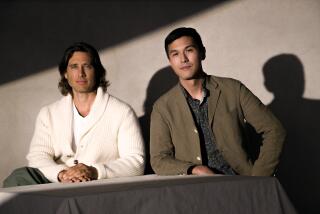
- Share via
That Michelle Yeoh would win an Oscar for playing several versions of her lead character in the multiverse comedy-drama “Everything Everywhere All at Once” seems cosmically right. And in her current guise as a “Star Trek” protagonist, she continues to be seemingly anything she wants to be, including multiple iterations of another person.
Since 2018, the international superstar has been on a tear, appearing in hit films like “Crazy Rich Asians,” “Shang-Chi and the Legend of the Ten Rings” and “Wicked” (and soon, “Avatar 4” and the upcoming “Blade Runner 2099” series), along with roles in several TV series. That includes her turn as starship Capt. Philippa Georgiou and her Mirror Universe doppelganger on “Star Trek: Discovery.” The “good” Georgiou died early in the series; the genocidal and wickedly intelligent Emperor Georgiou leads the franchise’s first-ever television movie, “Star Trek: Section 31,” now streaming on Paramount+.
“With the much-loved Capt. Philippa Georgiou, she was the most respected, highly decorated captain that understood humanity and compassion,” says Yeoh of her “Discovery” character, who is a mentor of eventual protagonist Michael Burnham (Sonequa Martin-Green). “In the emperor’s world, there is no empathy. It never even crosses their minds. You can see in everyone’s eyes in the Mirror Universe, it’s like, ‘How do I take you down?’ It’s sadly reflected in our world: How many leaders want to stay up there forever and ever? It’s dangerous. It feels as though they’re trying to make themselves immortal.”

“Section 31” was originally conceived as a series, but it was reworked into a film after the COVID-19 pandemic pushed back production and Yeoh’s schedule became busier after her Oscar win. But she was intent on returning to “Star Trek.”
“When we were filming ‘Discovery,’ I went to [executive producer] Alex Kurtzman and said, ‘We have to do a spinoff,’” Yeoh says. “I thanked the writers for dreaming up a character like that. What an amazing playground.”
With her pitch-dark past and lack of compunction about killing, she’s unlike any other “Star Trek” protagonist. Even her demeanor is not “Trek”-like, sometimes to comic effect.
Alex Kurtzman, who oversees the current ‘Star Trek’ franchise, discusses the series finale of ‘Discovery’ and what to expect from ‘Starfleet Academy’ and ‘Section 31.’
“[Georgiou] says, ‘Are you dumb? This is the path to do it.’ And everyone’s like — ,” says Yeoh as she makes stammering noises. When the vast majority of characters in the franchise behave respectfully, the Emperor’s lack of politesse is a breath of fresh air.
In the new movie, Georgiou is so bad she’s good. She’s living out of the spotlight in a corner of non-Federation space in the Prime Universe when Section 31 operatives come to recruit her for a high-stakes mission that ends up having deeply personal resonance for her.
“She thinks, ‘I’m doing OK. I’m under the radar. I’m not killing anyone,’” Yeoh says, nearly cackling. “But she can’t help herself. She needs to know what’s going on. And this is why Section 31 comes looking for her again, because if anything needs to be done — she’s not just a killer but a brain.”

Though some fans have long been uneasy about the existence of a military intelligence unit that exists to do dirty jobs outside of the United Federation of Planets’ rules, Section 31 and Georgiou are like the bitter but necessary medicine in “Trek” creator Gene Roddenberry’s near-utopian vision.
“Georgiou is the person who does all the right things for all the wrong reasons,” says Kurtzman, who helms the ever-expanding “Star Trek” television universe. “And we want to believe that person is out there to keep us safe.”
Yeoh describes “Section 31” as “Mission: Impossible” in space, with “a motley crew” of morally flexible spies. But it’s still the “Trek” universe and even features the much younger version of a character, Rachel Garrett (Kacey Rohl), who will become a hero of the Federation in one of the best-known episodes of “Star Trek: The Next Generation.” But the movie looks and feels different from other “Trek” fare, with extensive handheld camera work, an emphasis on action (making hay with Yeoh’s fighting skills) and modern slang worked into the dialogue. It’s sort of a flip side of “Star Trek,” like its mirror protagonist.
For the first time in its 57-year existence, “Star Trek” made a musical episode. Our television critic and ‘Star Trek’ fan Robert Lloyd discusses the episode with reporter and musical theater lover Ashley Lee.
“If Georgiou had never come to the Prime Universe, she would have stayed [ruthless] forever. [Even now,] it’s like, ‘How do you take care of this problem? Just nuke them, problem solved,’” Yeoh says. She likes leaving fans to puzzle over her questionable actions: “Is she doing this to survive, or does she want to do this?”
“Section 31” director Olatunde Osunsanmi said that unpredictability is what makes Yeoh so fascinating to watch. “The way Michelle plays the character, you never know what’s coming out of her mouth next. You never know who she could kill next,” he says. “She’s also able to do the other side, the action, which she pushed for, and handle herself physically. Now we have a character that’s the full spectrum, that isn’t just what they say but also what they do.”
Kurtzmann says the 62-year-old star “works really, really hard,” pushing herself physically like no other actor he’s worked with. “When the actor who’s playing the part is playing it with such confidence, it allows you to toggle back and forth between comedy and drama effortlessly,” he says.
Yet Yeoh’s casting was an anomaly for the franchise — an actual international superstar stepping into a central role in a “Star Trek” series (by comparison, William Shatner and Patrick Stewart were considerably less well-known when they received their commissions). So many fans were gobsmacked when Georgiou died in “Discovery’s” second episode.

“There was a lot of controversy over her death. The reason we did that, obviously, was to set up her return in the back half, but we couldn’t tell anybody at the time,” Kurtzman says. “But what was really fun about it was that Michelle gets to play the most delicious version of that character. The [Prime] Georgiou was a wonderful, lovely human being, but ultimately, and I think Michelle would say this too, nowhere near as interesting.”
Yeoh agrees: “Emperor Georgiou is much more complicated. What is going on in that head?”
“In the beginning, ‘friends’ is almost a nasty word for her,” says Yeoh, shuddering at the thought of nice Prime denizens trying to befriend the emperor. “They’re like a disease.” But the Prime Universe has been changing her: “Now, in ‘Section 31,’ is this the road to redemption?”
Playing an Asian woman who can be not only atypical but many things at once is exactly the kind of representation Yeoh has advocated for — and embodied — in her decades-long career. The different incarnations of her character in “Everything Everywhere” and “Star Trek” are appropriate for an actor who is practically a multiverse unto herself. After all, the multilingual Yeoh earned her initial fame as a beauty queen (Miss Malaysia World in 1983); became one of the world’s foremost action stars in a string of hits in which she performed her own stunts, including the Oscar-winning “Crouching Tiger, Hidden Dragon”; garnered acclaim in varied film and TV roles; and has been a longtime activist for conservation, HIV/AIDS, gender equality and poverty reduction causes.
She muses, maybe in a later role, she could be the president of the United States or M in James Bond. “Because when you see women that look like us in those kinds of positions, you go, ‘Oh, right. It’s possible. Why not?’ That’s what we want to encourage our young to think, that anything is possible,” Yeoh says.
She’s also apparently plenty persuasive off-camera.

Osunsanmi, who describes himself as strictly a “behind-the-camera guy,” says Yeoh told him he was going to be in the movie. He told her firmly he was not. Then, during shooting, a costumer told him Yeoh had sent shoes to try on. Then a hairstylist told him, “‘Michelle has a wig for you to try on.’ ‘Michelle has decided you’re gonna wear glitter.’”
He was unwavering, until “Michelle came over and said, ‘You have to do it, otherwise the cast won’t go on camera,’” he says, laughing. “So I got dressed and the crew got the biggest kick out of it. If you look carefully, I am there in the [background] of a fight sequence with Michelle.”
For her part, in her current incarnation as an actor promoting “Section 31,” Yeoh has her pitch down: “I want you to pull your phaser out and put it on ‘fun.’ There’s so much humor, and especially [fun is] the cast that Alex and Tunde have amassed.”
Fun? But isn’t the center of this spies-in-space show a genocidal murderer?
“She was!,” the actor cheerily admonishes. “She was!”
Times staff writer Tracy Brown contributed to this report.
More to Read
The complete guide to home viewing
Get Screen Gab for everything about the TV shows and streaming movies everyone’s talking about.
You may occasionally receive promotional content from the Los Angeles Times.









